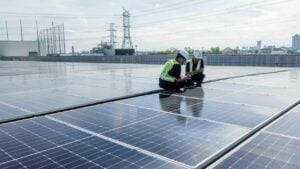Human Rights Watch: Gender-based violence remains rampant in South Africa

A new report from Human Rights Watch (HRW) has revealed the dire state of gender-based violence (GBV) in South Africa and is urging the government to do more to combat the troubling findings.
Described as the country’s “second pandemic” by President Cyril Ramaphosa, GBV in South Africa is still increasing at an alarming rate, making it one of the world’s most unsafe places for women: According to statistics a woman is murdered every three hours in South Africa.
Experts say much of the GBV in South Africa is culturally deep-rooted, with patriarchal attitudes entrenched by high levels of poverty and unemployment which leave women particularly vulnerable.
Earlier this year, DW’s The 77 Percent hosted a Street Debate in Johannesburg on the issue of GBV. During the debate, survivors of domestic abuse and rape, frontline workers and perpetrators spoke out on how South African society needs to change.
As the world marks the International Day for the Elimination of Violence Against Women, the report also serves as a wake-up call to South African authorities, explained HRW researcher Wendy Isaack, especially as the country continues to grapple with the impacts of the pandemic.
“The government of South Africa has been addressing gender-based violence during the crisis over the past year,” she said. “But a large-scale and fully resourced effort will be needed to ensure the COVID-19 crisis and its fallout over the next years doesn’t result in South Africa’s rates for gender-based violence worsening further.”
More funding needed
Based on interviews conducted by HRW at seven shelters across the country, as well as six other frontline organizations working directly with victims, one of the key problems that needs addressing is a lack of government funding.
“The government is not providing enough funding for shelters and they’re not providing funding in a timely manner,” HRW emergencies researcher for the Women’s Rights Division, Sky Wheeler, told DW.
While the South African government has acknowledged high rates of GBV both before and during the COVID-19 pandemic — including in the National Strategic Plan — broken promises to follow through with funding and pandemic-related problems such as lockdowns and job losses have only exacerbated the situation.
“We found that during the COVID-19 pandemic and during the lockdown these problems continued and made things much more difficult for shelters to be able to provide these life-saving services for women and other victims of gender-based violence,” said Wheeler.
HRW also stressed that many victims of GBV belong to marginalized communities who already struggle to access support networks.
“Often especially vulnerable groups, for example the LGBT+ community, sex workers who often face GBV and migrants who may be undocumented all need to get more outreach,” says Wheeler. “They find it even harder than other South Africans to access these services.”
Numbers still inconclusive
Although HRW was able to document the experiences of shelter workers and GBV victims in the report, it is still not clear exactly to what extent GBV increased during the pandemic — a fact that Wheeler says needs to be urgently addressed.
“We got a really wide range of answers when we asked people: Has gender-based violence gotten worse during the pandemic? The data sadly and problematically isn’t really that clear. And that indicates that more needs to be done to collect data.”
An analysis by the Heinrich Böll Foundation released in August found no clear indication that rates had increased, but recommended further research based on evidence including incomplete police reports and interviews with frontline workers. It is also common for victims to not report abuse, particularly during a lockdown.
“What is clear is that people who are already in danger of gender-based violence were put in a terrible situation,” explained Wheeler. “So, women who are already living with abusive partners were suddenly with them under lockdown all the time and with far fewer resources and places to go … If you don’t think you’re going to be able to find another job or a way to support yourself and your children, you’re much less likely to be able to leave a situation where you’re in danger of violence or even death.”
The South African government has also been criticized for not anticipating or acknowledging the impact of strict lockdowns in time and also failing to provide enough information to the public about shelters and services, leaving many unaware that they were able to leave their homes to seek help or protection.
SOURCE: DW News
Latest Thailand News
Follow The Thaiger on Google News:






























